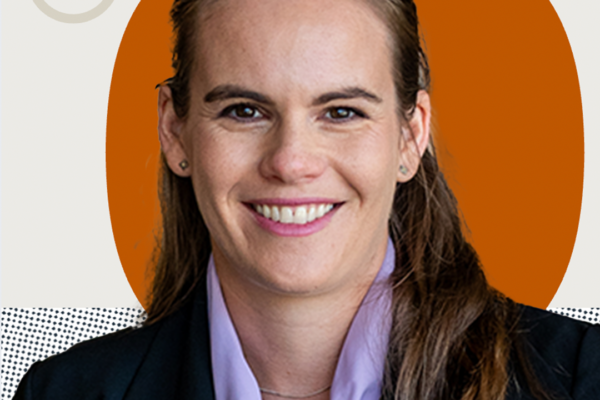Marketing AI’s Revolution
At the Texas McCombs Conference, a focus on artificial intelligence’s exponential growth
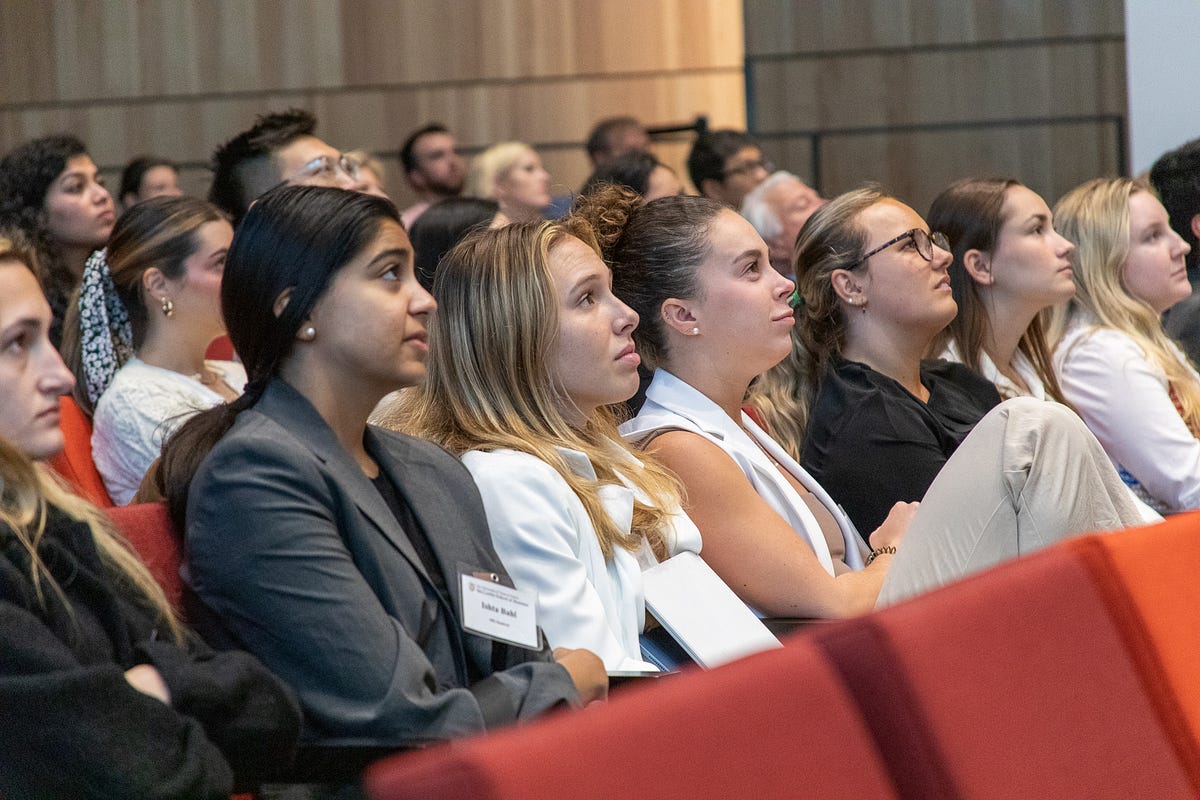
Tech experts tell us that the rise of AI — artificial intelligence technology that powers everything from ChatGPT to Amazon’s Alexa voice devices to self-driving cars — will be as profound a change for society as the introduction of the internet.
But one speaker at a conference on AI and marketing held Oct. 26–27 at the McCombs School of Business took it a step further. Jeremiah Owyang, a venture capitalist and partner at Blitzscaling Ventures, told students and professional marketers at UT, “AI is as consequential as the Industrial Revolution. We’re replacing brainpower with computing power. We can already feel the societal upheaval.”
Owyang was one of more than a dozen speakers who offered insights, tips and warnings about the present and future of AI at the Texas McCombs Marketing Conference, which took place at Rowling Hall on the UT campus. During the course of a day and a half, founders, corporate executives, authors and academics gave their perspectives on a $100 billion industry that is expected to grow by a factor of 20 by 2030. The conference was organized by second-year MBA leaders from two student organizations, Marketing Fellows and Graduate Marketing Network, with staff members at the Center for Customer Insight and Marketing Solutions at McCombs.
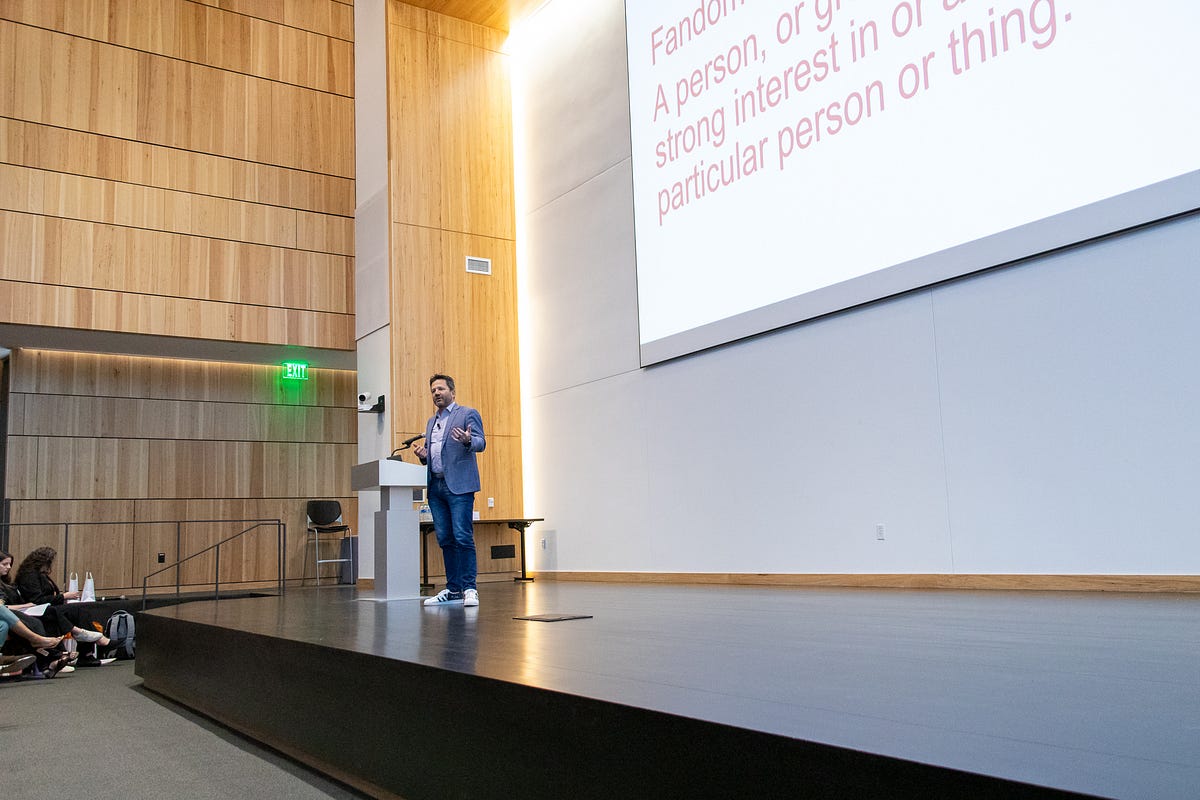
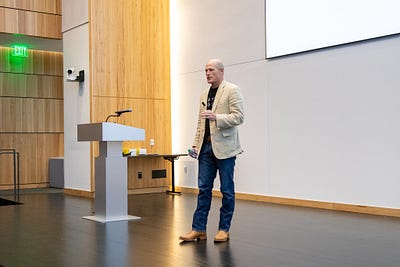
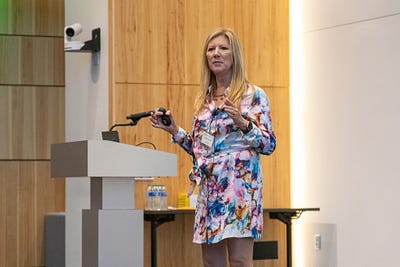
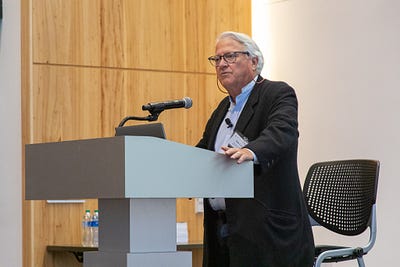
Changing media models
The event began with Bob Pearson, founder and chair of Next Practices Group and McCombs lecturer, who started the conference by providing a wide-ranging look at how media models are being transformed and pointing to customer trends that are helping drive AI’s growth.
Among the insights he shared were that videogaming and viewing of TikTok videos have become the most popular platforms for people online to build communities and that mobile phones are the center of the universe for many people. Also, Pearson said, people we respect (family members, YouTubers we regularly watch, friends) are replacing authority figures as the trustworthy figures we turn to for information.
The most important influencer in the world today, he said, is ChatGPT, the AI chatbot. ChatGPT, developed by a company called OpenAI, has drawn more than 180 million users and has been used for everything from creating television scripts to drafting legal documents and computer code based on plain-language requests from users, such as, “Write me a cover letter for a job in engineering.”
Generative AI, which can create new and original content and response, “is a game changer, the equivalent to the beginning of the web,” Pearson said.
There’s an opportunity for marketers to harness AI tools and expand the reach of brands 10 to 100 times with the same amount of effort and cost as they expend now, he said.
Pearson then hosted a sports branding panel featuring former Texas Longhorn and Kansas City Chiefs NFL linebacker Derrick Johnson, UT track record holder and pro athlete Rhasidat Adeleke, and UT basketball forward Brock Cunningham. The panel began with a video recording from famed sports agent David Falk, who suggested e-sports and gambling will be heavily affected by AI, as will the practice of evaluating and drafting players to pro sports.
The three athletes on the panel discussed the pressures of balancing their training with the modern demands of social media and branding that public figures such as athletes must contend with. AI, Cunningham suggested, will still require humans to study the ebb and flow of sporting events, but it’s inevitable that teams and athletes will use the tools as they evolve. “It won’t be a huge advantage over anything else,” he said. “AI is just a tool; it’s how you use it that separates you from others that use it.”
AI tools for marketers
Owyang’s talk, delivered remotely over video call, was as fast-moving as the AI industry itself, which he says is spawning about 1,000 new AI projects a month in Silicon Valley and other places.
The venture capitalist touted tools including “There’s an AI for That,” an AI-powered tool that helps find other AI tools; Perplexity.ai, which is like Google but with much more detailed and conversational search results; and Pi.ai, a conversation-based digital assistant that can learn over lengthy periods.
His most profound takeaway was that brands have a huge advantage in using AI for marketing: Companies have proprietary and exclusive data to build their own artificial intelligence models and tools. “Your special asset is the data you have around your product, partners, and customers,” he told the audience.
Josh Feldmeth, MBA ’99, and Peter Dixon , senior partners at the consulting firm Prophet, walked attendees through an example of using AI tools to rebrand a product, in this case a mock-up of an ad for Bud Light using the TV character Ted Lasso. Although the results weren’t perfect, with some refinement, AI proved to be a good starting point for visualizing and refining a rough idea.
The chief marketing officer for Wendy’s, Carl Loredo, MBA ’03, discussed how to cultivate fandom (people or groups with a strong interest in something) with technology. He presented a behind-the-scenes look of how Wendy’s celebrated its self-generated national holiday National Roast Day, this year celebrated with 111 individualized videos posted to TikTok. With the help of an AI chatbot, a quick-response human team to approve and capture scripts and voice acting for animation, Wendy’s ended up with 100 million views. “Four years ago, this would be impossible,” Loredo said. “These are powerful tools.”
Cherri Prince, BBA ’90, the new president of the marketing agency Media Horizons, offered a presentation on staying creative. The talk included strategies for keeping your mind fresh even as you’re drowning in data and guidelines for divergent thinking.
Hypergiant, an AI software company focused on space, defense and infrastructure, was represented by CEO Mike Betzer, who discussed the challenge of working minute-to-minute for entities such as the U.S. government. “Humans can’t make sense of all that data,” he said. “We have minutes to respond, sometimes seconds. Time is the most precious asset you have.”
Author, consultant and podcast Tim Love spoke about the increasing difficulty society is having in telling truth from misinformation as AI influences decision makers, and makes it easier for bad players to create fake images, videos, and other media. Love warned that AI-driven misinformation is no less than a national security thread; he urged marketers to fight it. “Marketers will need to lead this reformation because the government can’t or won’t,” Love said.
AI for all businesses
The conference’s talks concluded with a presentation by Rachel Woods, MIS ’18, a former data scientist at Facebook who founded The AI Exchange, a private network focused on helping businesses learn about and adopt AI.
Woods suggested that even the smallest businesses can take advantage of free, off-the-shelf AI software to start building AI tools to help organize customer feedback and learning from the data they have.
She offered attendees some practical directions on building datasets and incorporating them into AI systems. In many businesses, she said, there’s pressure for workers to “figure it out” when it comes to AI, but, “Nobody knows what they’re doing.” This skills gap, she said, is an area where up-and-coming marketers can get a jump on the future.
At the end of the conference, winners of the McCombs AI Marketing Challenge Awards were announced. Teams of McCombs MBA and MS Marketing students competed for $7,000 in cash and prizes. In the challenge, teams created a plan to use AI-driven insights to create marketing campaigns to promote Salesforce AppExchange. The winning team was the AI-Steins, which included Cecilia Gonzalez, Alondra Villarreal, Parker Redelman, and Matt Romeo.
Story by Omar L. Gallaga
About this Post
Share:


